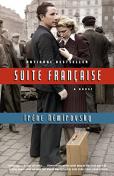BKMT READING GUIDES
Suite Francaise
by Irene Nemirovsky
Kindle Edition : 0 pages
82 clubs reading this now
20 members have read this book
Introduction
Beginning in Paris on the eve of the Nazi occupation in 1940. Suite Française tells the remarkable story of men and women thrown together in circumstances beyond their control. As Parisians flee the city, human folly surfaces in every imaginable way: a wealthy mother searches for sweets in a town without food; a couple is terrified at the thought of losing their jobs, even as their world begins to fall apart. Moving on to a provincial village now occupied by German soldiers, the locals must learn to coexist with the enemy—in their town, their homes, even in their hearts.When Irène Némirovsky began working on Suite Française, she was already a highly successful writer living in Paris. But she was also a Jew, and in 1942 she was arrested and deported to Auschwitz, where she died. For sixty-four years, this novel remained hidden and unknown.
From the Trade Paperback edition.
Discussion Questions
Questions from the Publisher:1. The novelist, who herself fled Paris on the eve of the Nazi invasion, wrote the book virtually while the occupation was happening, most likely making Suite Française the first work of fiction about World War II. How do you think she managed to write while she herself was in jeopardy? Do you think it was easier for her to capture the day-to-day realities of life under occupation? In what ways might the book have been different if she had survived and been able to write Suite Française years after the war?
2. Suite Française is a unique pair of novels. Which of the two parts of Suite Française do you prefer? Which structural organization did you find more effective: the short chapters and multiple focus of Storm in June, or the more restricted approach of Dolce?
3. What is the significance of the title Dolce?
4. How does Suite Française undermine the long-held view of French resistance to the German occupation?
5. Discuss Irène Némirovsky’s approach to class in Suite Française. How do the rich, poor, and the middle classes view one another? How do they help or hinder one another? Do the characters identify themselves by class or nationality?
(You might consider the aristocratic Mme de Montmort’s thought in Dolce: “What separates or unites people is not their language, their laws, their customs, but the way they hold their knife and fork.”)
6. In Dolce, we enter the increasingly complex life of a German-occupied provincial village. Coexisting uneasily with the soldiers billeted among them, the villagers—from aristocrats to shopkeepers to peasants—cope as best they can. Some choose resistance, others collaboration. Each relationship is distorted by the allegiances of war. What happens when someone—who might have been your friend—is now declared your enemy during a war?
7. The lovers in the second novel question whether the needs of the individual or the community should take priority. Lucille imagines that “in five, or ten, or twenty years” this problem will have been replaced by others. To what extent, if at all, has this proved the case? Has Western society conclusively decided to privilege the individual over the group?
8. How does Suite Française compare to other World War Two novels you have read? How would you compare it to the great personal documents of the war (for example, those written by Anne Frank and Victor Klemperer), or to fiction?
9. “Important events—whether serious, happy or unfortunate—do not change a man’s soul, they merely bring it into relief, just as a strong gust of wind reveals the true shape of a tree when it blows of all its leaves.” —Storm in June, p.203
Do you agree?
10. Consider Irène Némirovsky’s plan for the next part of Suite Française (in the appendix). What else do you think could happen to the characters?
Book Club Recommendations
Recommended to book clubs by 4 of 6 members.
Book Club HQ to over 88,000+ book clubs and ready to welcome yours.
Get free weekly updates on top club picks, book giveaways, author events and more








